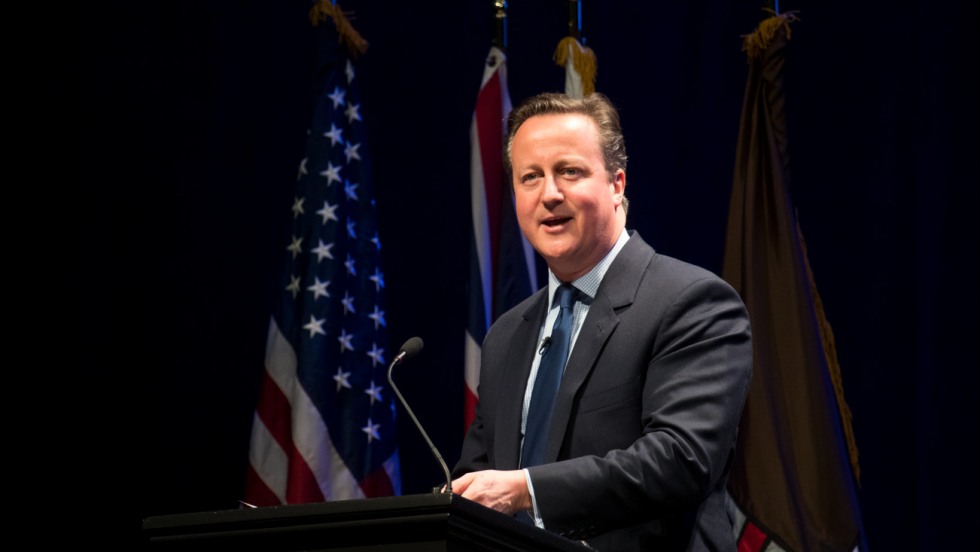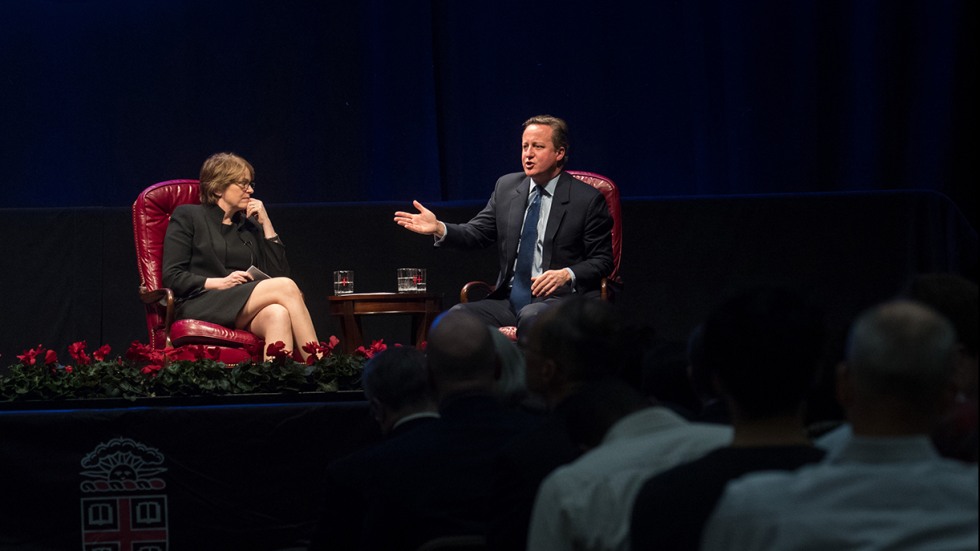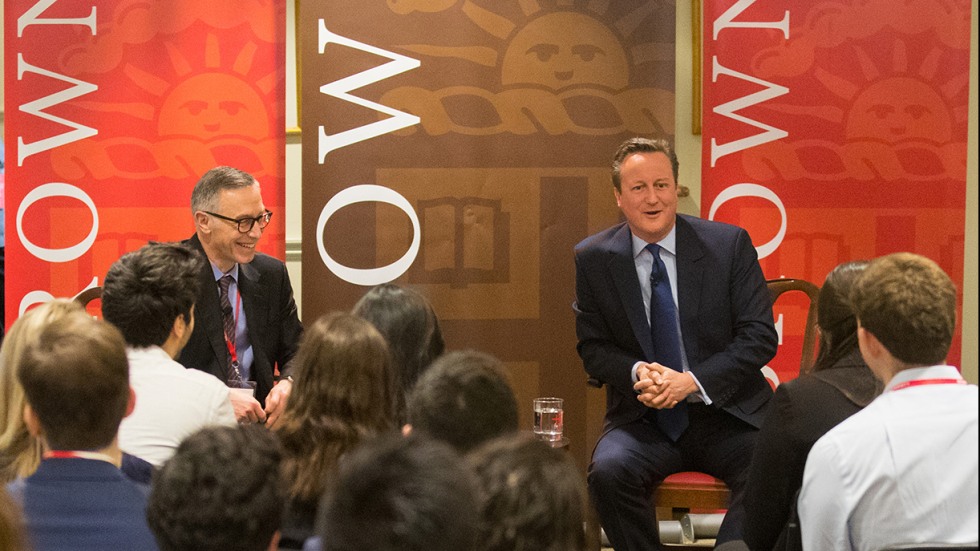PROVIDENCE, R.I. [Brown University] — In a speech at Brown University just hours after the British government signaled its intent to formally begin the process of departing the European Union, former United Kingdom Prime Minister David Cameron presented his vision for “course corrections” needed in the wake of the “Brexit” decision and the election of Donald Trump as president in the U.S.
And that optimistic vision centered not on a move to isolationist policies that have failed the U.K. and the U.S. at multiple points through history, but on a return to democratic values the two countries have long shared, he told a crowd of some 2,400 students, faculty, alumni and community members during Brown’s 94th Stephen Ogden Jr. ’60 Memorial Lecture on International Affairs.
After an introduction by University President Christina Paxson in which she noted to laughs his fitting presence in New England, where the countries’ “special relationship” began in 1776, Cameron held forth on issues ranging from Brexit and anti-globalism to Islamic extremism and the Syrian refugee crisis. He called on citizens to work toward a better understanding of the issues underlying recent surges of anti-globalism in the U.S. and Europe and offered his list of priorities for politics and policy that would prove essential in addressing those issues.
First, he noted that while globalization has strengthened both nations, it has left many behind economically. “A rising tide has not lifted all boats,” Cameron said. “Rewards at the top have accelerated, wages at bottom have been stagnant, a middle-class lifestyle has been too out of reach to too many people. And the recovery from the financial crisis of 2007 has been too slow. We seem to be struggling to escape our recent past.”
He said that cultural changes have come too fast for many, making them bend toward anti-globalism out of fear. “If we don’t address the problem of those left behind economically, we will fall party to the policies of the extreme left,” he said. “And if we don’t address the problem of those left behind culturally, we’ll fall prey to the parties of the extreme right.”
To remedy this, Cameron suggested an approach that combines free market economics, global trade and responsible capitalism, along with policies that uphold a strong minimum wage and a major investment in education and training for the jobs of the future. He said that when it comes to immigration policy, while it is counterproductive to single out people or countries based on religious belief, it is important to have strong borders and sensible immigration control that maintains the sovereignty of the nation-state.
Next, Cameron argued that both the U.S. and the U.K need to “remake arguments all over again for the values in our politics that have served us well,” pointing to British common law and the U.S. Constitution as strong foundations for democracies that uphold freedom under the rule of law. He said that this rule of law is what will maintain democracy despite the upheaval of change caused by leadership changes.
He pointed to Russia as a country that does not hold those same democratic beliefs and stressed the “importance of Western democracies standing together and maintaining our freedom through our strength and solidarity,” noting specifically the need to stand in solidarity with Eastern European countries that have become targets of Russian economic, political and military pressure.
“Under its current leadership, Russia can of course be a nation with which we have friendly relations, but it is not and cannot be a like-minded strategic partner in every regard,” he said. “We simply do not agree and will not agree about the rights of central and European states to choose their own futures.”
Cameron also discussed the need to think clearly about the most important global challenges that lie ahead during what is a time of political upheaval in both countries — chief among them, global poverty and Islamic extremism. While providing monetary aid to struggling countries is crucial, he argued, the focus of aid needs to shift to bolstering the political structures of the most fragile nations.
“Soon, half of the world’s poorest will be in fragile states — countries that are prone to conflict, corruption and even collapse,” he said. “We need a much greater focus on what makes nations fail and how we can help them succeed.”
Regarding Islamic extremism, Cameron called it “the greatest threat to our societies today.” Islam is a religion of peace, he noted, but said that the connection between terrorism and radical extremist Islamism should not be ignored.
“These terrorists and their apologists are trying to hijack a great religion and twist and pervert it for their ends,” he said. “We must play our part, standing and fighting alongside the moderates and against those who are wrecking this great religion.”
He likened the war on terrorism to the Cold War, in that it is in large part ideological. “We will win when we show that our values are the best way of delivering the peace, the prosperity and good societies that all people on earth crave,” Cameron said.
In closing, the former Prime Minister reiterated his belief in the long-held democratic values of the U.S. and the U.K. — ones that citizens of these countries must continually return to during times of political change.
“Sometimes the experts seem to be telling us that in order to succeed as countries, we need to be more like somewhere else — more like India or Russia or China, Singapore even,” Cameron said. “We should say no. We don’t need to be more like someone else. We need to be more like us, the real us. Yes, hardworking, pioneering, independent, creative, adaptable, optimistic and can-do, but also the guardians of freedom, of tolerance, of equality of opportunity and, yes, of justice. That is the spirit that made our countries great.”
Following Cameron’s remarks, Paxson asked the Prime Minister a series of questions curated from faculty and students, which touched on issues ranging from British domestic policy and the growing economic strength of China to a final query on whether or not Brown students should consider political careers, given the divisive political climate in the U.S.
At that final question, Cameron jumped enthusiastically to his feet with a resounding yes.
“I see that the United States is asking some questions about itself right now,” he said. “But you’re still the country, the society, the political system that others in many ways aspire to be. But you’ll only be that if good people get involved, take an interest and try to shape the world around them.”


